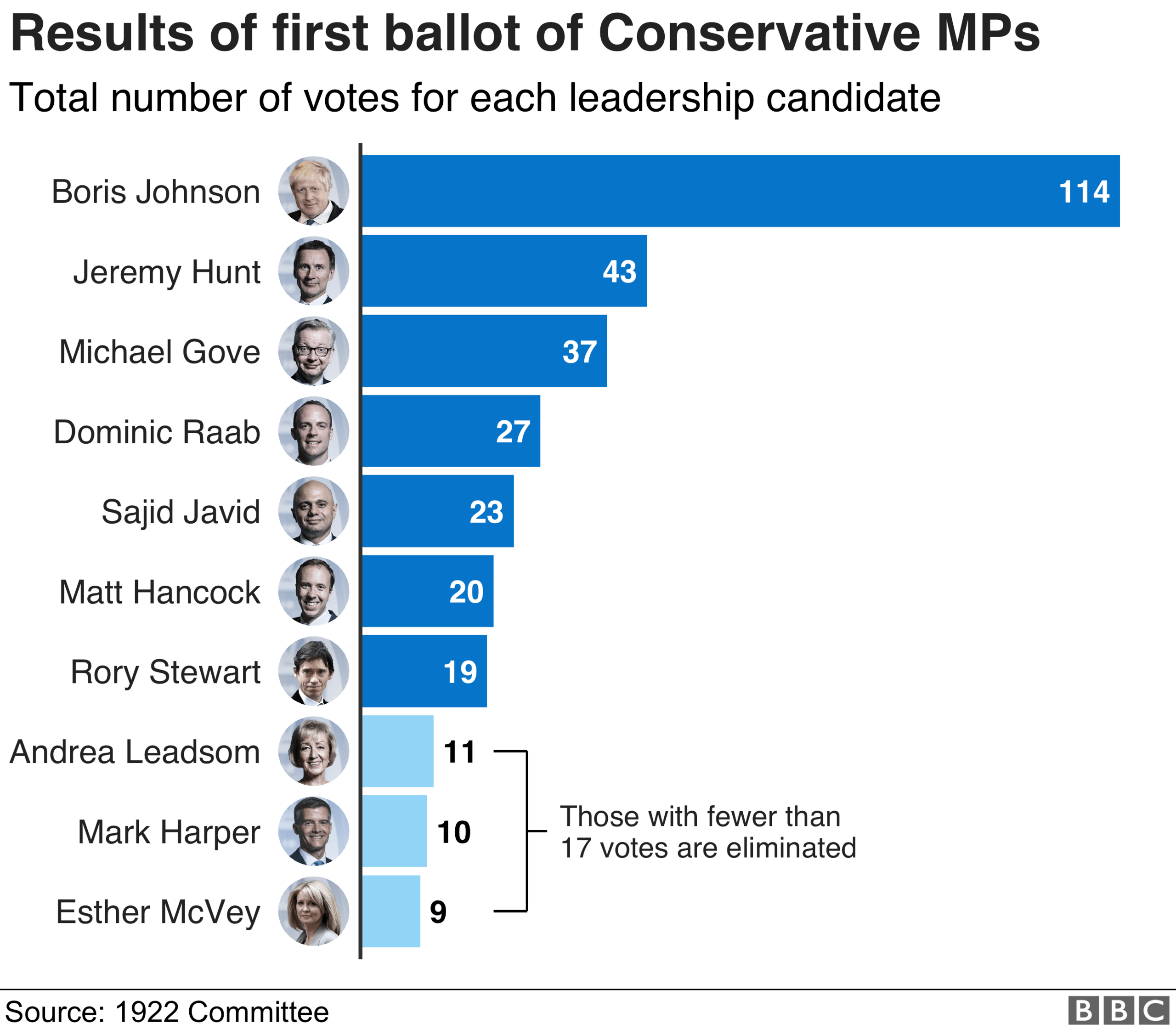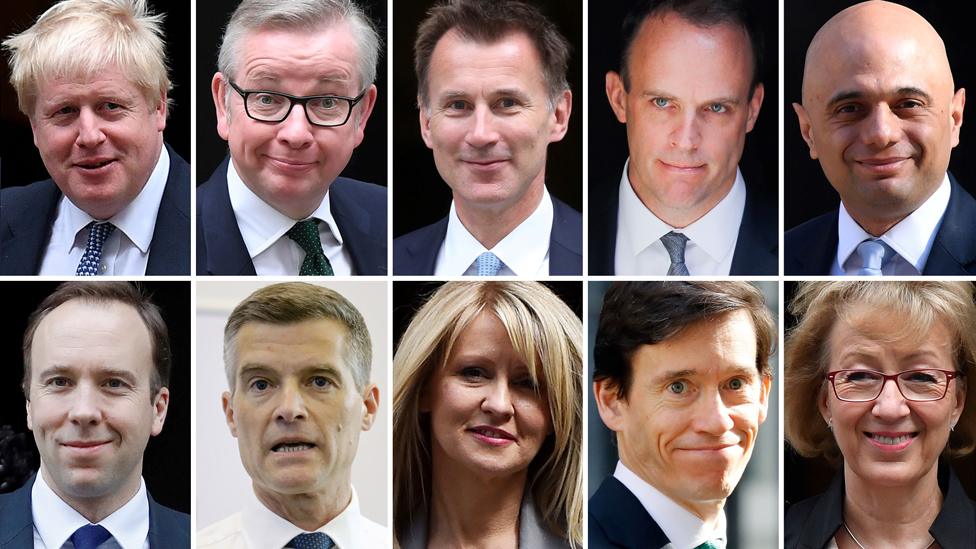Boris Johnson tops first ballot in Tory leadership contest
- Published
- comments
Cheryl Gillan announces the result with seven of the 10 candidates making it to round two
Boris Johnson has secured the highest number of votes in the first MPs' ballot to select the Conservative Party leader and next prime minister.
Three contenders - Mark Harper, Andrea Leadsom and Esther McVey - were knocked out in the secret ballot of Tory MPs.
Mr Johnson received 114 votes, significantly more than his nearest rival Jeremy Hunt, who came second with 43. Michael Gove was third with 37.
Seven candidates progress to the next round of voting next week.
The two who prove most popular after the last MPs' ballot will go to Conservative Party members in a final vote later this month.
The winner of the contest to succeed Theresa May is expected to be announced in the week of 22 July.
Sources close to Health Secretary Matt Hancock told the BBC's Laura Kuenssberg he was "mulling over" whether to withdraw from the contest after coming sixth with 20 votes.
Home Secretary Sajid Javid, who came fifth with 23 votes, is understood to be staying in the race for now. Some have suggested his candidacy - with support from Mr Hancock - could take on Mr Hunt to become second in the ballot.
Mr Johnson, a former foreign secretary who served for eight years as London mayor, said he was "delighted" to win but warned that his campaign still had "a long way to go".
Foreign Secretary Mr Hunt said: "Boris did well today but what the result shows is, when it comes to the members' stage, I'm the man to take him on."
Environment Secretary Mr Gove said it was "all to play for" and he was "very much looking forward" to candidates' TV debates on Channel 4 on Sunday and on BBC One next Tuesday.
All 313 Conservative MPs voted in the first ballot, including Mrs May, who refused to say whom she had backed.


The fourth-placed candidate, former Brexit secretary Dominic Raab, said he was "proud and honoured" and he had a "good base to build on".
Mr Javid said: "I look forward to continuing to share my positive vision and my plan for uniting the country."
Mr Hancock thanked his supporters, saying it was "terrific to have more votes from colleagues than I could have hoped for".
Rory Stewart said: "I don't look anything like the previous PM", and he negotiates "in a completely different way"
And International Development Secretary Rory Stewart, the seventh-placed candidate, told the BBC's Politics Live he was "completely over the Moon" to have got through the first vote.
He said he had had only six declared votes ahead of the poll, but "more than three times that" had voted for him in the secret ballot.


The margin of success took his fellow candidates by surprise - but not the core of Boris Johnson's team.
After many, many weeks of private campaigning, introducing Boris Johnson to the world of the spreadsheet, this morning one of his organisers wrote the number 114 and sealed it in an envelope.
At lunchtime, the announcement revealed the controversial former foreign secretary had indeed received exactly that number.
That is not just a marker of the level of Mr Johnson's support but for the sometimes clownish politician, whose reputation has risen and fallen and then risen again, it's a sign that it is different this time.

Justice Secretary David Gauke said Mr Stewart was now the main challenger to Mr Johnson, saying: "He's really in with a chance and the momentum is with Rory."
But Defence Secretary Penny Mordaunt, who is supporting Mr Hunt's campaign, said the foreign secretary was "attractive to many sides of the party because he's a serious individual".
And schools minister Nick Gibb told BBC Radio 4's World at One that Mr Gove was now "best placed as a Brexiteer to challenge the front runner" Mr Johnson in the final.

The UK's next prime minister


Further ballots are scheduled to take place on 18, 19 and 20 June to whittle down the contenders until only two are left.
The final pair will then be put to a vote of members of the wider Conservative Party from 22 June, with the winner expected to be announced about four weeks later.
After being knocked out of the contest, Mr Harper, a former government chief whip, said he continued "to believe we need a credible plan that delivers Brexit" in order to "restore trust".
Mrs Leadsom's campaign team said they were "disappointed" but "wish all the other candidates well".
And Ms McVey, who gained nine votes, coming last in the first round of MPs' ballots, said she was "extremely grateful" to those who had supported her.



TV debates 'important'
Televised candidates' debates are scheduled to take place, but not all the remaining seven have confirmed they are taking part.
Work and Pensions Secretary Amber Rudd, who is backing Mr Hunt, urged them to appear, saying the Conservative Party "needs to remember that we're not just choosing a leader, we're choosing a prime minister and the public need to see them".
And former Brexit secretary David Davis, who is backing Mr Raab, said it was "very important" for the public to hear from the contenders.
Mr Johnson has previously been criticised by some of his rivals for not taking part in media interviews during the campaign.
The leadership race has so far been dominated by Brexit and arguments over whether a deal can be renegotiated with the EU by 31 October, and whether talking up a no-deal Brexit is a plausible promise.


On Tuesday 18 June BBC One will host a live election debate between the Conservative MPs still in the race.
If you would like to ask the candidates a question live on air, use the form below. It should be open to all of them, not a specific politician.
Tory leadership rivals face first party vote
If you are reading this page on the BBC News app, you will need to visit the mobile version of the BBC website, external to submit your question on this topic.
- Published13 June 2019
